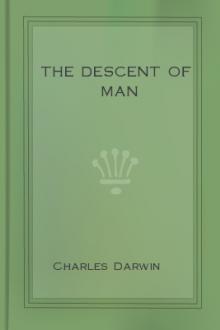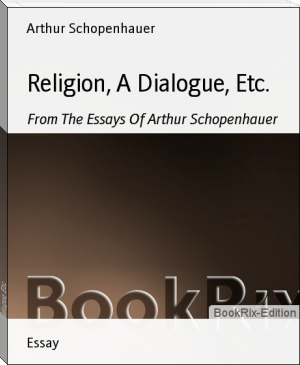Studies in Pessimism - Arthur Schopenhauer (books like harry potter .TXT) 📗

- Author: Arthur Schopenhauer
Book online «Studies in Pessimism - Arthur Schopenhauer (books like harry potter .TXT) 📗». Author Arthur Schopenhauer
Sardanapalus :
The very first
Of human life must spring from woman's breast,
Your first small words are taught you from her lips,
Your first tears quench'd by her, and your last sighs
Too often breathed out in a woman's hearing,
When men have shrunk from the ignoble care
Of watching the last hour of him who led them .
(Act I Scene 2.)
These two passages indicate the right standpoint for the appreciation of women.
You need only look at the way in which she is formed, to see that woman is not meant to undergo great labor, whether of the mind or of the body. She pays the debt of life not by what she does, but by what she suffers; by the pains of child-bearing and care for the child, and by submission to her husband, to whom she should be a patient and cheering companion. The keenest sorrows and joys are not for her, nor is she called upon to display a great deal of strength. The current of her life should be more gentle, peaceful and trivial than man's, without being essentially happier or unhappier.
Women are directly fitted for acting as the nurses and teachers of our early childhood by the fact that they are themselves childish, frivolous and short-sighted; in a word, they are big children all their life long - a kind of intermediate stage between the child and the full-grown man, who is man in the strict sense of the word. See how a girl will fondle a child for days together, dance with it and sing to it; and then think what a man, with the best will in the world, could do if he were put in her place.
With young girls Nature seems to have had in view what, in the language of the drama, is called a striking effect ; as for a few years she dowers them with a wealth of beauty and is lavish in her gift of charm, at the expense of all the rest of their life; so that during those years they may capture the fantasy of some man to such a degree that he is hurried away into undertaking the honorable care of them, in some form or other, as long as they live - a step for which there would not appear to be any sufficient warranty if reason only directed his thoughts. Accordingly, Nature has equipped woman, as she does all her creatures, with the weapons and implements requisite for the safeguarding of her existence, and for just as long as it is necessary for her to have them. Here, as elsewhere, Nature proceeds with her usual economy; for just as the female ant, after fecundation, loses her wings, which are then superfluous, nay, actually a danger to the business of breeding; so, after giving birth to one or two children, a woman generally loses her beauty; probably, indeed, for similar reasons.
And so we find that young girls, in their hearts, look upon domestic affairs or work of any kind as of secondary importance, if not actually as a mere jest. The only business that really claims their earnest attention is love, making conquests, and everything connected with this - dress, dancing, and so on.
The nobler and more perfect a thing is, the later and slower it is in arriving at maturity. A man reaches the maturity of his reasoning powers and mental faculties hardly before the age of twenty-eight; a woman at eighteen. And then, too, in the case of woman, it is only reason of a sort - very niggard in its dimensions. That is why women remain children their whole life long; never seeing anything but what is quite close to them, cleaving to the present moment, taking appearance for reality, and preferring trifles to matters of the first importance. For it is by virtue of his reasoning faculty that man does not live in the present only, like the brute, but looks about him and considers the past and the future; and this is the origin of prudence, as well as of that care and anxiety which so many people exhibit. Both the advantages and the disadvantages which this involves, are shared in by the woman to a smaller extent because of her weaker power of reasoning. She may, in fact, be described as intellectually short-sighted, because, while she has an intuitive understanding of what lies quite close to her, her field of vision is narrow and does not reach to what is remote; so that things which are absent, or past, or to come, have much less effect upon women than upon men. This is the reason why women are more often inclined to be extravagant, and sometimes carry their inclination to a length that borders upon madness. In their hearts, women think that it is men's business to earn money and theirs to spend it - - if possible during their husband's life, but, at any rate, after his death. The very fact that their husband hands them over his earnings for purposes of housekeeping, strengthens them in this belief.
However many disadvantages all this may involve, there is at least this to be said in its favor; that the woman lives more in the present than the man, and that, if the present is at all tolerable, she enjoys it more eagerly. This is the source of that cheerfulness which is peculiar to women, fitting her to amuse man in his hours of recreation, and, in case of need, to console him when he is borne down by the weight of his cares.
It is by no means a bad plan to consult women in matters of difficulty, as the Germans used to do in ancient times; for their way of looking at things is quite different from ours, chiefly in the fact that they like to take the shortest way to their goal, and, in general, manage to fix their eyes upon what lies before them; while we, as a rule, see far beyond it, just because it is in front of our noses. In cases like this, we need to be brought back to the right standpoint, so as to recover the near and simple view.
Then, again, women are decidedly more sober in their judgment than we are, so that they do not see more in things than is really there; whilst, if our passions are aroused, we are apt to see things in an exaggerated way, or imagine what does not exist.
The weakness of their reasoning faculty also explains why it is that women show more sympathy for the unfortunate than men do, and so treat them with more kindness and interest; and why it is that, on the contrary, they are inferior to men in point of justice, and less honorable and conscientious. For it is just because their reasoning power is weak that present circumstances have such a hold over them, and those concrete things, which lie directly before their eyes, exercise a power which is seldom counteracted to any extent by abstract principles of thought, by fixed rules of conduct, firm resolutions, or, in general, by consideration for the past and the future, or regard for what is absent and remote. Accordingly, they possess the first and main elements that go to make a virtuous character, but they are deficient in those secondary qualities which are often a necessary instrument in the formation of it.[1]
[Footnote 1: In this respect they may be compared to an animal organism which contains a liver but no gall-bladder. Here let me refer to what I have said in my treatise on The Foundation of Morals , § 17.]
Hence, it will be found that the fundamental fault of the female character is that it has no sense of justice . This is mainly due to the fact, already mentioned, that women are defective in the powers of reasoning and deliberation; but it is also traceable to the position which Nature has assigned to them as the weaker sex. They are dependent, not upon strength, but upon craft; and hence their instinctive capacity for cunning, and their ineradicable tendency to say what is not true. For as lions are provided with claws and teeth, and elephants and boars with tusks, bulls with horns, and cuttle fish with its clouds of inky fluid, so Nature has equipped woman, for her defence and protection, with the arts of dissimulation; and all the power which Nature has conferred upon man in the shape of physical strength and reason, has been bestowed upon women in this form. Hence, dissimulation is innate in woman, and almost as much a quality of the stupid as of the clever. It is as natural for them to make use of it on every occasion as it is for those animals to employ their means of defence when they are attacked; they have a feeling that in doing so they are only within their rights. Therefore a woman who is perfectly truthful and not given to dissimulation is perhaps an impossibility, and for this very reason they are so quick at seeing through dissimulation in others that it is not a wise thing to attempt it with them. But this fundamental defect which I have stated, with all that it entails, gives rise to falsity, faithlessness, treachery, ingratitude, and so on. Perjury in a court of justice is more often committed by women than by men. It may, indeed, be generally questioned whether women ought to be sworn in at all. From time to time one finds repeated cases everywhere of ladies, who want for nothing, taking things from shop-counters when no one is looking, and making off with them.
Nature has appointed that the propagation of the species shall be the business of men who are young, strong and handsome; so that the race may not degenerate. This is the firm will and purpose of Nature in regard to the species, and it finds its expression in the passions of women. There is no law that is older or more powerful than this. Woe, then, to the man who sets up claims and interests that will conflict with it; whatever he may say and do, they will be unmercifully crushed at the first serious encounter. For the innate rule that governs women's conduct, though it is secret and unformulated, nay, unconscious in its working, is this: We are justified in deceiving those who think they have acquired rights over the species by paying little attention to the individual, that is, to us. The constitution and, therefore, the welfare of the species have been placed in our hands and committed to our care, through the control we obtain over the next generation, which proceeds from us; let us discharge our duties conscientiously . But women have no abstract knowledge of this leading principle; they are conscious of it only as a concrete fact; and they have no other method of giving expression to it than the way in which they act when the opportunity arrives. And then their conscience does not trouble them so much as we fancy; for in the darkest recesses of their heart, they are aware that in committing a breach of their duty towards the individual, they have all the better fulfilled their duty towards the species, which is infinitely greater.[1]
[Footnote 1: A more detailed discussion
The very first
Of human life must spring from woman's breast,
Your first small words are taught you from her lips,
Your first tears quench'd by her, and your last sighs
Too often breathed out in a woman's hearing,
When men have shrunk from the ignoble care
Of watching the last hour of him who led them .
(Act I Scene 2.)
These two passages indicate the right standpoint for the appreciation of women.
You need only look at the way in which she is formed, to see that woman is not meant to undergo great labor, whether of the mind or of the body. She pays the debt of life not by what she does, but by what she suffers; by the pains of child-bearing and care for the child, and by submission to her husband, to whom she should be a patient and cheering companion. The keenest sorrows and joys are not for her, nor is she called upon to display a great deal of strength. The current of her life should be more gentle, peaceful and trivial than man's, without being essentially happier or unhappier.
Women are directly fitted for acting as the nurses and teachers of our early childhood by the fact that they are themselves childish, frivolous and short-sighted; in a word, they are big children all their life long - a kind of intermediate stage between the child and the full-grown man, who is man in the strict sense of the word. See how a girl will fondle a child for days together, dance with it and sing to it; and then think what a man, with the best will in the world, could do if he were put in her place.
With young girls Nature seems to have had in view what, in the language of the drama, is called a striking effect ; as for a few years she dowers them with a wealth of beauty and is lavish in her gift of charm, at the expense of all the rest of their life; so that during those years they may capture the fantasy of some man to such a degree that he is hurried away into undertaking the honorable care of them, in some form or other, as long as they live - a step for which there would not appear to be any sufficient warranty if reason only directed his thoughts. Accordingly, Nature has equipped woman, as she does all her creatures, with the weapons and implements requisite for the safeguarding of her existence, and for just as long as it is necessary for her to have them. Here, as elsewhere, Nature proceeds with her usual economy; for just as the female ant, after fecundation, loses her wings, which are then superfluous, nay, actually a danger to the business of breeding; so, after giving birth to one or two children, a woman generally loses her beauty; probably, indeed, for similar reasons.
And so we find that young girls, in their hearts, look upon domestic affairs or work of any kind as of secondary importance, if not actually as a mere jest. The only business that really claims their earnest attention is love, making conquests, and everything connected with this - dress, dancing, and so on.
The nobler and more perfect a thing is, the later and slower it is in arriving at maturity. A man reaches the maturity of his reasoning powers and mental faculties hardly before the age of twenty-eight; a woman at eighteen. And then, too, in the case of woman, it is only reason of a sort - very niggard in its dimensions. That is why women remain children their whole life long; never seeing anything but what is quite close to them, cleaving to the present moment, taking appearance for reality, and preferring trifles to matters of the first importance. For it is by virtue of his reasoning faculty that man does not live in the present only, like the brute, but looks about him and considers the past and the future; and this is the origin of prudence, as well as of that care and anxiety which so many people exhibit. Both the advantages and the disadvantages which this involves, are shared in by the woman to a smaller extent because of her weaker power of reasoning. She may, in fact, be described as intellectually short-sighted, because, while she has an intuitive understanding of what lies quite close to her, her field of vision is narrow and does not reach to what is remote; so that things which are absent, or past, or to come, have much less effect upon women than upon men. This is the reason why women are more often inclined to be extravagant, and sometimes carry their inclination to a length that borders upon madness. In their hearts, women think that it is men's business to earn money and theirs to spend it - - if possible during their husband's life, but, at any rate, after his death. The very fact that their husband hands them over his earnings for purposes of housekeeping, strengthens them in this belief.
However many disadvantages all this may involve, there is at least this to be said in its favor; that the woman lives more in the present than the man, and that, if the present is at all tolerable, she enjoys it more eagerly. This is the source of that cheerfulness which is peculiar to women, fitting her to amuse man in his hours of recreation, and, in case of need, to console him when he is borne down by the weight of his cares.
It is by no means a bad plan to consult women in matters of difficulty, as the Germans used to do in ancient times; for their way of looking at things is quite different from ours, chiefly in the fact that they like to take the shortest way to their goal, and, in general, manage to fix their eyes upon what lies before them; while we, as a rule, see far beyond it, just because it is in front of our noses. In cases like this, we need to be brought back to the right standpoint, so as to recover the near and simple view.
Then, again, women are decidedly more sober in their judgment than we are, so that they do not see more in things than is really there; whilst, if our passions are aroused, we are apt to see things in an exaggerated way, or imagine what does not exist.
The weakness of their reasoning faculty also explains why it is that women show more sympathy for the unfortunate than men do, and so treat them with more kindness and interest; and why it is that, on the contrary, they are inferior to men in point of justice, and less honorable and conscientious. For it is just because their reasoning power is weak that present circumstances have such a hold over them, and those concrete things, which lie directly before their eyes, exercise a power which is seldom counteracted to any extent by abstract principles of thought, by fixed rules of conduct, firm resolutions, or, in general, by consideration for the past and the future, or regard for what is absent and remote. Accordingly, they possess the first and main elements that go to make a virtuous character, but they are deficient in those secondary qualities which are often a necessary instrument in the formation of it.[1]
[Footnote 1: In this respect they may be compared to an animal organism which contains a liver but no gall-bladder. Here let me refer to what I have said in my treatise on The Foundation of Morals , § 17.]
Hence, it will be found that the fundamental fault of the female character is that it has no sense of justice . This is mainly due to the fact, already mentioned, that women are defective in the powers of reasoning and deliberation; but it is also traceable to the position which Nature has assigned to them as the weaker sex. They are dependent, not upon strength, but upon craft; and hence their instinctive capacity for cunning, and their ineradicable tendency to say what is not true. For as lions are provided with claws and teeth, and elephants and boars with tusks, bulls with horns, and cuttle fish with its clouds of inky fluid, so Nature has equipped woman, for her defence and protection, with the arts of dissimulation; and all the power which Nature has conferred upon man in the shape of physical strength and reason, has been bestowed upon women in this form. Hence, dissimulation is innate in woman, and almost as much a quality of the stupid as of the clever. It is as natural for them to make use of it on every occasion as it is for those animals to employ their means of defence when they are attacked; they have a feeling that in doing so they are only within their rights. Therefore a woman who is perfectly truthful and not given to dissimulation is perhaps an impossibility, and for this very reason they are so quick at seeing through dissimulation in others that it is not a wise thing to attempt it with them. But this fundamental defect which I have stated, with all that it entails, gives rise to falsity, faithlessness, treachery, ingratitude, and so on. Perjury in a court of justice is more often committed by women than by men. It may, indeed, be generally questioned whether women ought to be sworn in at all. From time to time one finds repeated cases everywhere of ladies, who want for nothing, taking things from shop-counters when no one is looking, and making off with them.
Nature has appointed that the propagation of the species shall be the business of men who are young, strong and handsome; so that the race may not degenerate. This is the firm will and purpose of Nature in regard to the species, and it finds its expression in the passions of women. There is no law that is older or more powerful than this. Woe, then, to the man who sets up claims and interests that will conflict with it; whatever he may say and do, they will be unmercifully crushed at the first serious encounter. For the innate rule that governs women's conduct, though it is secret and unformulated, nay, unconscious in its working, is this: We are justified in deceiving those who think they have acquired rights over the species by paying little attention to the individual, that is, to us. The constitution and, therefore, the welfare of the species have been placed in our hands and committed to our care, through the control we obtain over the next generation, which proceeds from us; let us discharge our duties conscientiously . But women have no abstract knowledge of this leading principle; they are conscious of it only as a concrete fact; and they have no other method of giving expression to it than the way in which they act when the opportunity arrives. And then their conscience does not trouble them so much as we fancy; for in the darkest recesses of their heart, they are aware that in committing a breach of their duty towards the individual, they have all the better fulfilled their duty towards the species, which is infinitely greater.[1]
[Footnote 1: A more detailed discussion
Free e-book «Studies in Pessimism - Arthur Schopenhauer (books like harry potter .TXT) 📗» - read online now
Similar e-books:





Comments (0)